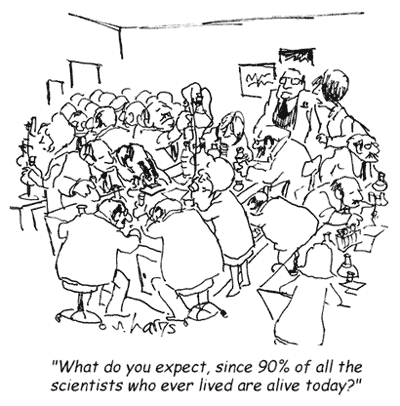by Maximilian Fochler

Many of us privately or professionally interested in science think that healthy competition is what drives science forward. In current research policy and funding, this belief is so strong that competitiveness has become the central doctrine guiding the governance of research and of individual researchers.
But can too much competition also endanger the very aims we would like research to achieve, such as asking fundamental questions at the frontier of knowledge? This is what a group of high-profile life scientists, including a former editor of Science magazine, suggested in 2014 by warning that the current hyper-competition in the US life sciences may suppress “the creativity, cooperation, risk-taking, and original thinking required to make fundamental discoveries“ (Alberts, Kirschner, Tilghman, & Varmus, 2014, p. 5774).
But is science more competitive today than in the past, and if so, why and how? At least two main things have changed. First, in the late twentieth century, driven by rising societal expectations in the innovative capacities of research, many scientific fields have thrived and grown. The life sciences are a strong case here, but not the only example. However, this growth has happened much less in long-term institutional positions, but in a new form of the organisation of research work: project-based temporal employment. This has created a large generation of highly qualified young researchers competing for a basically stagnating or receding number of faculty positions. Second, the rise of new metric forms of keeping track and assessing scientific productivity has made competition seemingly more transparent, but also fuelled it. Impact factors, rankings and other indicator-based measurements do not only represent scientific work, they also shape it, as also Alex Rushforth and Sarah de Rijcke argue in a recent blogpost. Because they matter in competition they may also change the very nature of this work.
But how does this affect the work and life of researchers, and how precisely may these new forms of competition hurt science? Together with Ulrike Felt and Ruth Müller, I provide answers to these questions in a recent paper. We focused on young researchers (PhD students and postdocs) in the life sciences, for two reasons: first, those who do not yet have a stable position in science are particularly affected by the dynamics sketched above. Second, at least some of those growing into science today will be tomorrow’s senior scientists. Hence, the way they are socialized into doing research, the values and habits they acquire, are likely to shape the way science will be like in the future.
Working with biographical interviews, we were interested in understanding which values drive the decisions young life scientists make both in their research work and in their careers. And we were curious to know where the values that mattered for them came from, and how they were related to the way they expected to be evaluated in their further careers.
We discovered a striking difference between PhD students and postdocs. PhD students referred to a range of different values guiding their current and futures lives in research, ranging from fostering the local intellectual climate of their groups over publication productivity to the wish to contribute to the solution of societal problems. Postdocs were so concerned with whether they would be able to secure their next employment and make the transition to a long-term position that their own individual success and performance in competition was virtually all that mattered to them. Growing further into science, all that could not be translated directly into a line in a CV seemed to lose importance.
We draw four conclusions on how dynamics such as these may create problems for science’s development. First, they create deeply unsustainable biographies, and may render a career in research an unattractive choice. Young researchers sacrifice much to conform to an ever more rigid image of a successful scientist. But we know that by far not all will succeed, and the sacrifices made may have dire biographical consequences for those not remaining in academia. Among the PhD students we interviewed, many chose to opt out of a career in research for precisely these reasons.
Second, the individualism fuelled by this extreme competition will challenge the social cohesion of higher education institutions, which may increasingly be seen as stepping stones on the route to individual academic careers rather than as places of collective intellectual inquiry. Third, science may loose focus of the wider societal problems and values it should contribute to as it ever more strongly focuses on competitive dynamics driven by mostly internalist forms of value and evaluation.
And last, as indicated by the life scientists cited above, also the intellectual development of the sciences may be stifled. In our sample, postdocs tended to be more calculating and less ready to take risks in their epistemic questions than PhD students. It seems that they were increasingly socialized into a way of working that focussed on hedging their career chances rather than making full use of their creativity.
Is this the way we would like science to develop? If not, then the institutions and individuals governing science will have to more carefully consider which forms of competition their decisions create, and be wary about the negative side of competition.
.
References
Alberts, B., Kirschner, M. W., Tilghman, S., & Varmus, H. (2014). Rescuing US biomedical research from its systemic flaws. Proceedings of the National Academy of Sciences, 111(16), 5773-5777. doi:10.1073/pnas.1404402111
Fochler, M., Felt, U., & Müller, R. (2016). Unsustainable Growth, Hyper-Competition, and Worth in Life Science Research: Narrowing Evaluative Repertoires in Doctoral and Postdoctoral Scientists’ Work and Lives. Minerva, 1-26. doi:10.1007/s11024-016-9292-y
Maximilian Fochler is assistant professor at the Department of Science and Technology Studies of the University of Vienna. His main current research interests are forms of knowledge production at the interface of science and other societal domains (such as the economy), as well as the impact of new forms of governing science on academic knowledge production.